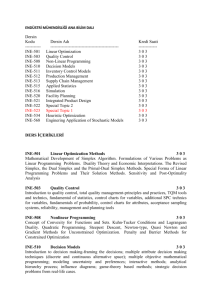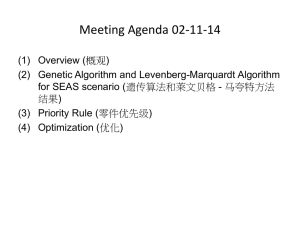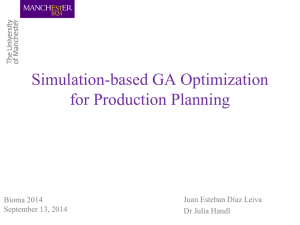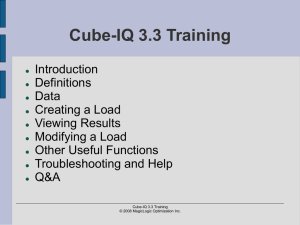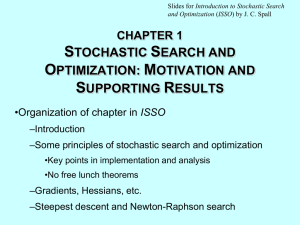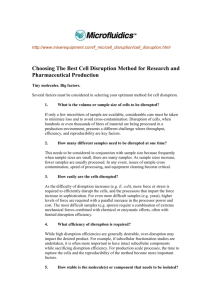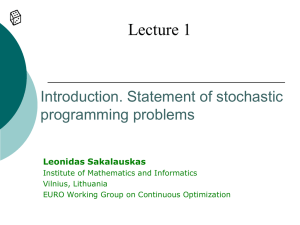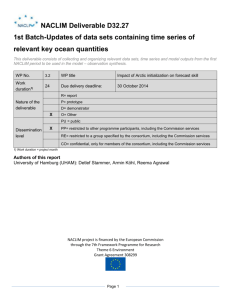Power Point - LOG OPT HOME
advertisement
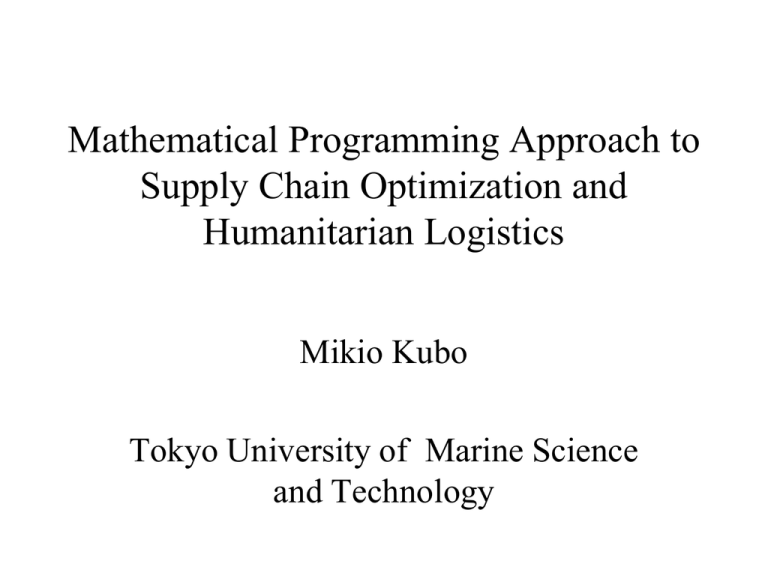
Mathematical Programming Approach to Supply Chain Optimization and Humanitarian Logistics Mikio Kubo Tokyo University of Marine Science and Technology Supply Chain “Risk” Management (SCRM) Performance Proactive and response approaches to cope with supply chain disruptions. Disruption Recovery Proactive Response Time Humanitarian Logistics (HL) … is a branch of logistics which specializes in organizing the delivery and warehousing of supplies during natural disasters to the affected area and people. • Decentralized • No SCM unit nor trained staffs • Everything is ad hoc • No performance measure (fairness, speed, …) • No information & communication technology • Many players (government, NGOs) Mathematical Optimization Approach to SCRM and HL • Stochastic Optimization a classical mathematical programming approach to cope with uncertainty • Disruption (Recovery) Management an approach to recover from disruption quickly (mainly used in airline and rail industries) • Risk Optimization a new framework =Stochastic Optimization + Disruption Management Stochastic Optimization (1) Performance Here & Now Variables Recourse Variables =>flexibility scenarios Disruption Proactive Response Time Stochastic Optimization (2) Scenario approach (# of typical scenarios is not so large) S : set of scenarios x : here & now variable vector Xs: recourse variable vector for scenario s Stochastic Optimization (3) +CVaR approach (disruption is a rare event; decision maker is risk averse) (1- λ ) Expectation + λ [ β-CVaR] Disruption Management (1) Response Action X Performance Base Solution x* Disruption Deviation from x* Proactive Response Time Disruption Management (2) = Recovery Optimization After a disruption (scenario), find a recovery solution that is close to the “base” solution x* Risk Optimization A new framework to copy with disruptions = Stochastic + Recovery Optimization Supply Chain Risk Optimization Models モデル名 準備フェイズ 応答フェイズ 途絶要因 確率的在庫 複数調達/在庫 適応発注/緊急発注 供給途絶 安全在庫配置 複数調達/在庫 調達先・リード時間 変更 生産時間変動 ロットサイズ決定 多モード/複数調 達/在庫 モード選択/生産量 調整 資源途絶/ 生産時間変動 スケジューリング 多モード/ 余裕時間 ・資源 モード選択 リスケジューリング 資源途絶/ 作業時間変動 配送計画 余裕時間 ・資源 緊急配車/ リスケジューリング 移動時間変更/資源 途絶 ネットワーク設計 多モード/余裕資 源/在庫 モード選択/リルー ティング 資源途絶/生産・輸送 時間変動 収益管理 安全在庫 価格変更 需要・供給途絶 Probabilistic Inventory Model (1) Multi period, Single stage, Static policy, Nominal Variables I: inventory B: backorder x: ordering amount Parameters h: inventory cost b: backorder cost p: probability δ: =0 disruption occurs =1 otherwise Probabilistic Inventory Model (2) Multi period, Single stage, Static policy, CVaR Probabilistic Inventory Model (3) Multi period, Multi stage, Adaptive policy, Nominal Resource Constrained Scheduling Problem (1) Resource Constrained Scheduling Problem (2) Resource constraints Precedence constraints Processing time (p), resource upper bound (RUB), and resource usage (a) depend on scenarios 人道支援サプライ・チェイン最適化 即時決定変数 (備蓄場所, 備蓄量決定) 操 業 途絶 度 ( 性 能 支援物資備蓄・配置 ) (ストラテジック,タクティカル ) 予防 リコース変数 (備蓄品輸送量, 輸送経路決定) 多期間輸送計画 多期間在庫配送計画 (タクティカル,オペレーショナル) 応答 時間 支援物資備蓄・配置モデル • 動機 – 避難所に保管されていた備蓄品(支援物資) が流された(土砂で埋まった) – 備蓄予算で水と乾パンだけを購入(保管しや すいから) • 適切な箇所に適切な備蓄を行う(即時決定 変数) • 災害発生後の輸送経路(リコース変数) 多期間輸送計画モデル • 動機 – 行政単位で支援物資を直接長距離輸送で受 け入れ – 緊急に必要な物資とそうでない物資が混在 (需要と供給のミスマッチ) – 大量の不要在庫 • 日別の需要を適切に 選択された中継地点 を経由して輸送(在庫) するモデル 多期間在庫配送計画モデル • 動機 – 最終需要地点(避難所)への配送の遅れ – 初期に必要な支援物資(毛布)と,その後に必 要になる支援物資(清潔用品,食品)の切り替 え – (非効率な)高頻度補充 • 多期間の在庫+配送の同時求解モデル

